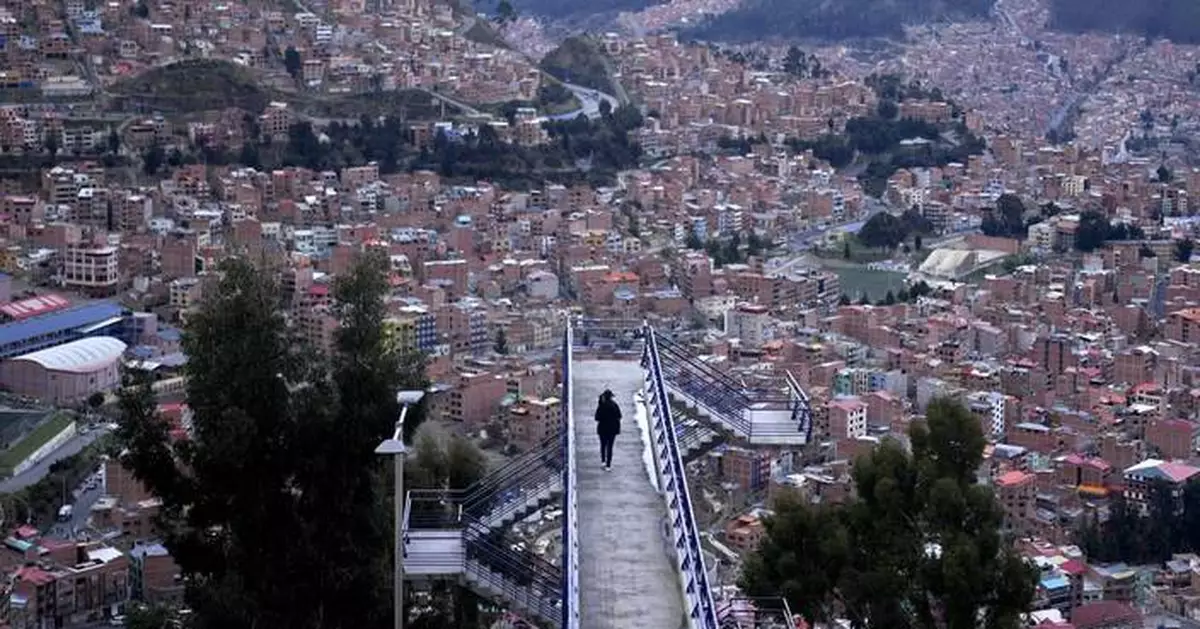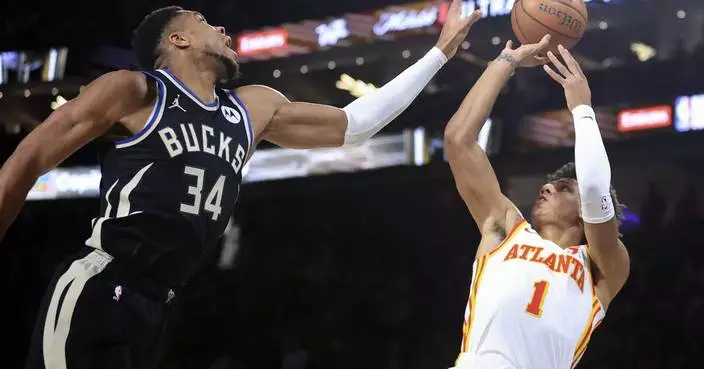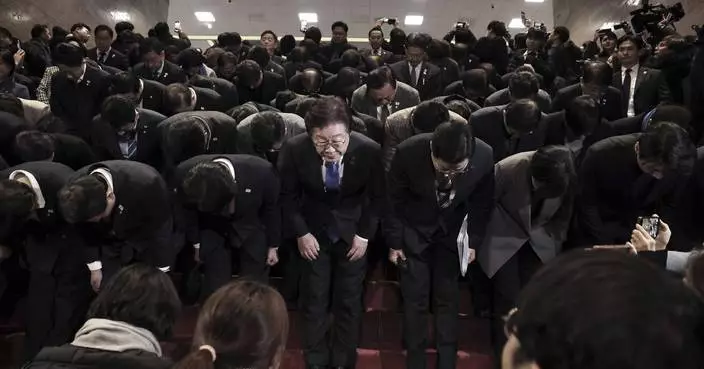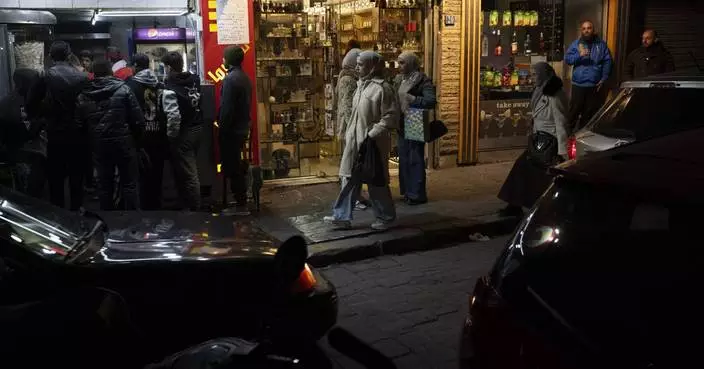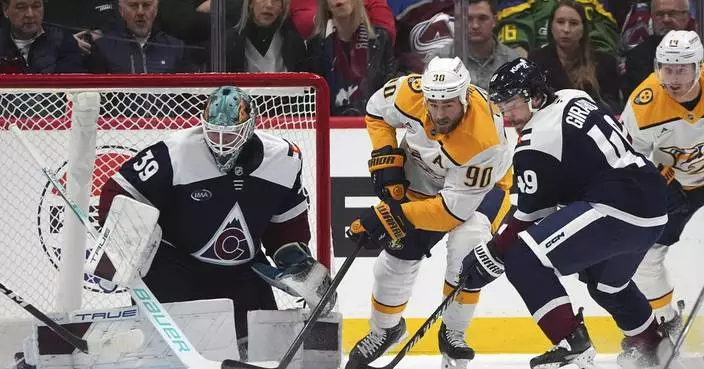LA PAZ, Bolivia (AP) — Campaigning for Sunday's judicial election may be strictly forbidden, but look closer on the streets of Bolivia’s capital, La Paz, and you’ll find that some candidates have sneakily plastered their faces on packs of corn puffs and others have slipped subtle slogans into official voting manuals.
After all, it’s a popular vote, and even a bit of PR can work wonders when voters know nothing about the dozens of names on their sprawling ballot papers.
Click to Gallery
FILE - A woman walks past a mural featuring socialist leaders, from left; former Bolivian President Evo Morales, late Venezuelan President Hugo Chavez and revolutionary Ernesto "Che: Guevara, at the bus terminal in Sacaba, Bolivia, Nov. 20, 2024. (AP Photo/Juan Karita, File)
FILE - Justice employees hold up cutouts of Supreme Court justices in a show of support as they discuss a draft ruling that proposes the partial invalidation of the judicial reform approved by Congress, in Mexico City, Nov. 5, 2024. (AP Photo/Fernando Llano, File)
FILE - Legislators rally in favor of judicial reform at Congress, in Mexico City, Sept. 12, 2024. (AP Photo/Felix Marquez)
FILE - Julia Ramos, the newly named vice president of a faction of the Movement Towards Socialism (MAS) party, speaks with Bolivian President Luis Arce, in El Alto, Bolivia, Nov. 28, 2024. (AP Photo/Juan Karita, File)
FILE - Bolivia's former President Evo Morales speaks during an interview in Lauca N in the Chapare region of Bolivia, Nov. 21, 2024. (AP Photo/Juan Karita, File)
FILE - Supporters of former President Evo Morales protest the extension of the mandate for elected judges, who ruled against Morales' re-election and demand new judicial elections, in La Paz, Bolivia, Jan. 29, 2024. (AP Photo/Juan Karita, File)
FILE - A woman walks across a pedestrian bridge in La Paz, Bolivia, Nov. 27, 2024. (AP Photo/Juan Karita, File)
Bolivia is the only country in the world that holds elections for top judicial posts. Soon Mexico will, too, after former President Andrés Manuel López Obrador pushed through a highly contentious overhaul of the justice system in the face of mass protests.
As Bolivia's ex-President Evo Morales did when remaking the judiciary in 2009, López Obrador has championed the overhaul as a way to purge the corrupt elite and boost democracy.
But apathetic Bolivian voters say the elections have had the opposite effect, turning their courts from neutral arbiters into political prizes.
“I’ll flip a coin,” said 25-year-old architecture student Marisol Nogales when asked how she would vote on Sunday.
It’s never easy to find supporters of Bolivia’s system of electing judges, which, over a decade ago, replaced a nomination system rooted in qualifications and training.
Across the world, academics, investors and judges have warned that judicial elections can cement the dominance of the ruling party and gut checks and balances. And across Latin America, from El Salvador to Honduras, experts have characterized politicized judiciaries as profound threats to democracy.
In Bolivia, even senior judicial officials struggle to sound positive when asked to defend the election.
“It should be a calm, easy and simple process, but it has become very litigious, very controversial,” Francisco Vargas, the vice president of Bolivia’s electoral tribunal, told The Associated Press from the court in central La Paz.
This year in Bolivia, experts find it even harder than usual to praise the system. With the posts up for grabs every six years, Sunday’s vote was supposed to take place in late 2023.
But as the deadline approached last year, the Constitutional Court — packed with allies of President Luis Arce — suddenly intervened to push the vote back a year, escalating his power struggle with his former mentor and current rival, Morales, over who will lead their long-dominant leftist party into Bolivia’s 2025 presidential election.
Both understand that whoever wins over the Constitutional Court ensures their own political survival.
Arce cited the paralysis of their divided party in justifying the vote's delay. Morales' loyalists, who hold a majority in Congress and would have determined the shortlist of judicial candidates, accused Arce of illegally extending the mandates of friendly judges for fear of losing influence over the courts.
“What happened was disorder, the kind that can lead us to a greater conflict,” said Iván Lima, the former Minister of Justice.
The Inter-American Court of Human Rights criticized the postponement of elections, raising alarm about its “potential to undermine the effective functioning of the Bolivian justice system.”
Now, after many attempts to derail and further delay the vote, it is finally moving ahead Sunday. But there’s a wrinkle: It's a partial election. Only four out of nine seats on the powerful Constitutional Court are up for grabs. The other five — the majority of sitting judges, as it happens — will stay in their posts.
“The judges have turned the Constitutional Court into a sort of super power,” said Bolivian political analyst Paul Coca.
Sunday marks the third time that Bolivia has held judicial elections. If the past two rounds under then-President Morales, in 2011 and 2017, are any indication, turnout will be low. Both times, the majority of Bolivians, outraged or simply baffled by the notion of endorsing unknown judges pre-selected by Morales’ allies with little transparency, voted null or blank.
Critics questioned the legitimacy of the elected judges. But they nonetheless shaped the evolution of Bolivian democracy.
In 2016, Morales asked Bolivians in a legally binding referendum to decide whether to let him run for a fourth term, in defiance of a two-term limit established in the 2009 Constitution he had backed.
When he didn’t get the answer he wanted — a slim majority voted “no” — his party found a workaround through the pliant Constitutional Court, where judges ruled that to deny Morales another term as president would be to violate his human rights.
“This was his major mistake,” said Eduardo Rodríguez Veltzé, a former chief justice of the Supreme Court.
It was Morales’ decision to run again in 2019 that brought a precipitous end to his remarkable 14-year tenure and ushered in a surreal parade of crises. As allegations of electoral fraud sent angry crowds into the streets, Morales resigned under pressure from the military and went into exile.
Five years after coming under fire for allegedly manipulating the courts, Morales now finds himself on the receiving end of the judiciary he overhauled.
“First Evo’s party used the court to challenge the referendum’s results to promote another candidacy. Then Arce’s administration colluded with the same Constitutional Court to delay and reduce judicial elections to favor the self-prorogated judges, who run politics through judicial review,” Veltzé said.
Last year, the Constitutional Court endorsed a controversial resolution from the northeastern province of Beni that the government insists blocks Morales from running for president in 2025.
Last October, a prosecutor in Bolivia’s southern province of Tarija issued an arrest warrant for Morales after reviving a 2016 statutory rape case against him.
And earlier this week, the country’s top criminal court swiftly extradited Morales’ former anti-drug chief to stand trial in the United Staes on charges of cocaine trafficking, despite criticism from legal experts unsatisfied by the court's review of evidence.
“They've been trying to destroy me morally, legally and politically,” Morales told the AP about the legal cases against him.
Vargas, the tribunal’s vice president, is quick to insist that Bolivia is not some kind of strange outlier for electing judges by popular vote. The U.S., Switzerland and Japan also hold judicial elections. But, he conceded, not in such a sweeping way as Bolivia does, or as Mexico will.
Mexico’s new president, Claudia Sheinbaum, bracing for fallout from the overhaul she inherited, is keen to see how Bolivia’s vote plays out. The National Electoral Institute, the Mexican voting authority, sent a delegation to observe the process in La Paz this weekend, Vargas said.
When asked whether he would recommend that Mexico follow Bolivia’s example, Vargas let out a sharp laugh.
“If you want me to tell you my personal opinion,” he said, “it might cause me some problems."
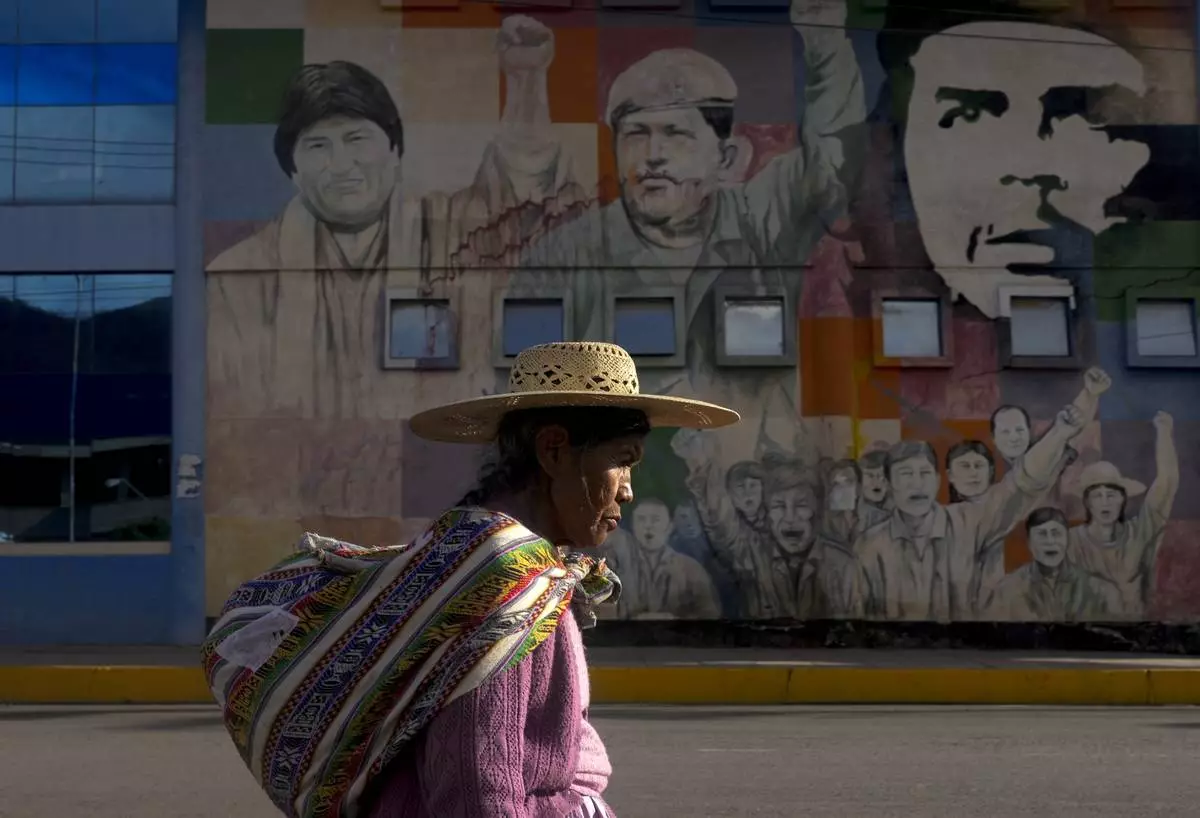
FILE - A woman walks past a mural featuring socialist leaders, from left; former Bolivian President Evo Morales, late Venezuelan President Hugo Chavez and revolutionary Ernesto "Che: Guevara, at the bus terminal in Sacaba, Bolivia, Nov. 20, 2024. (AP Photo/Juan Karita, File)
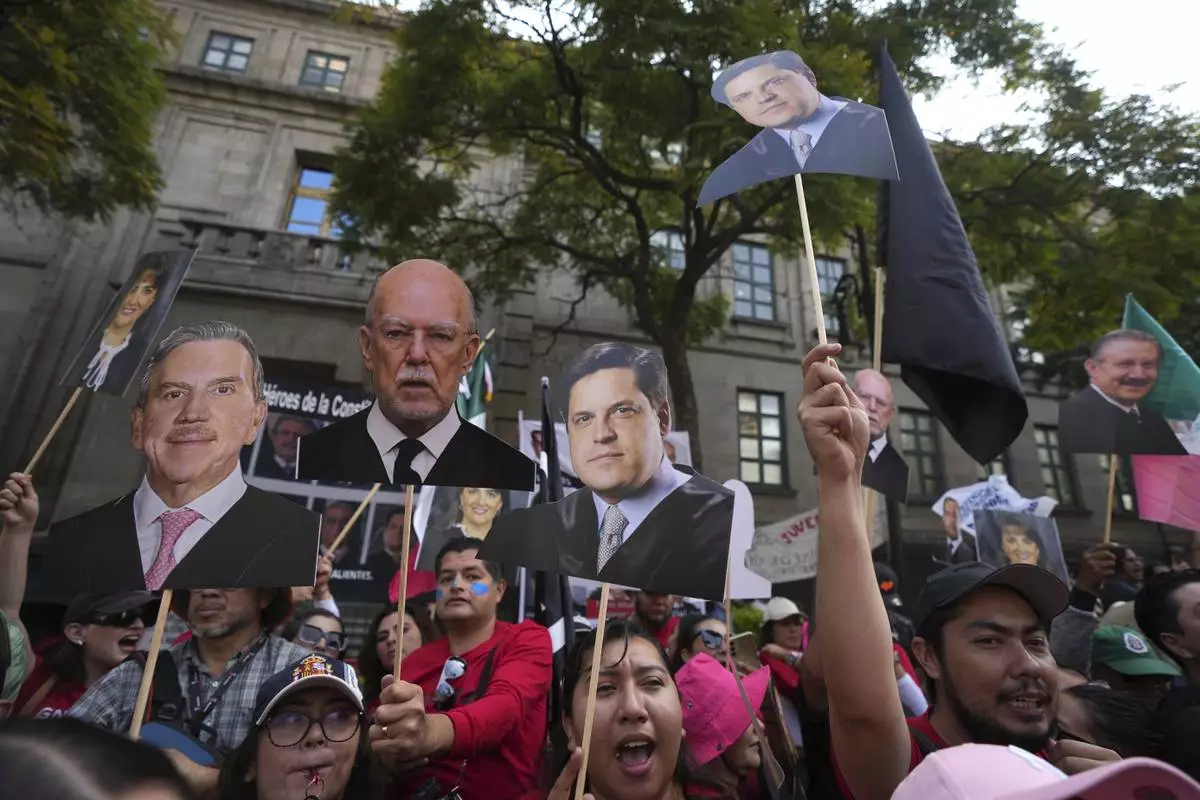
FILE - Justice employees hold up cutouts of Supreme Court justices in a show of support as they discuss a draft ruling that proposes the partial invalidation of the judicial reform approved by Congress, in Mexico City, Nov. 5, 2024. (AP Photo/Fernando Llano, File)
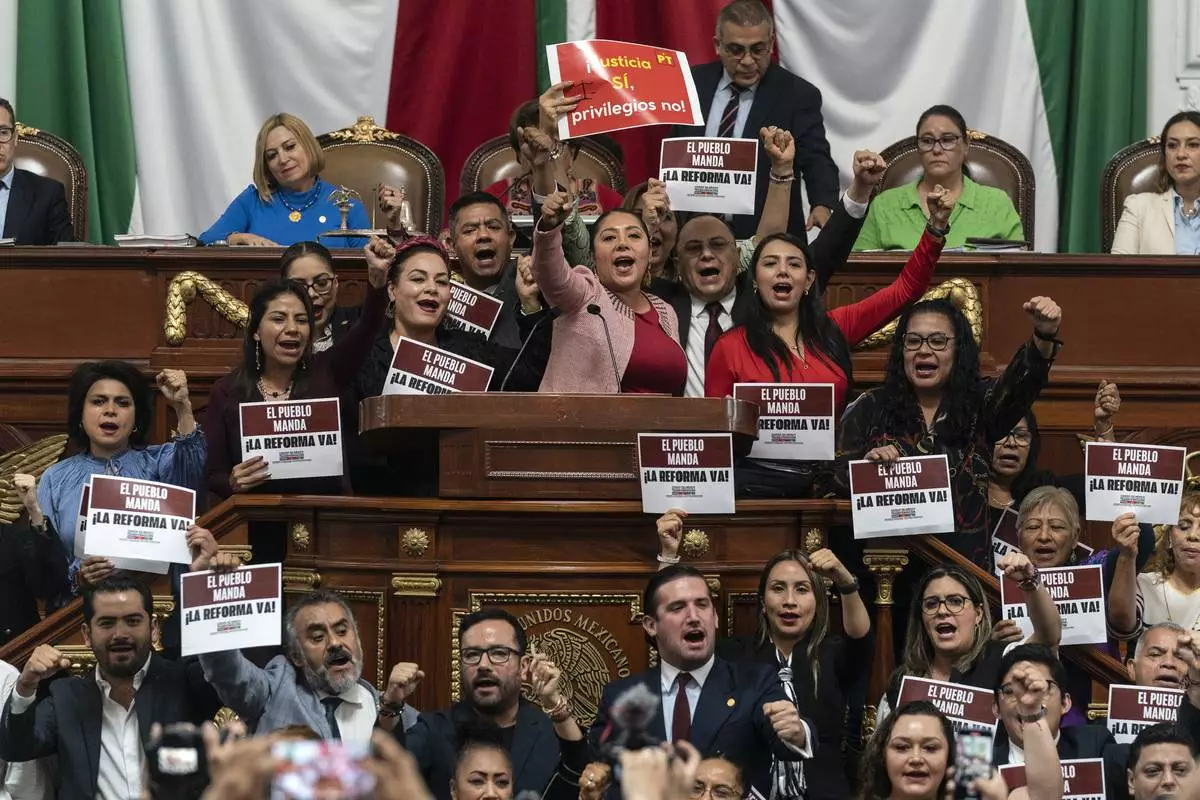
FILE - Legislators rally in favor of judicial reform at Congress, in Mexico City, Sept. 12, 2024. (AP Photo/Felix Marquez)
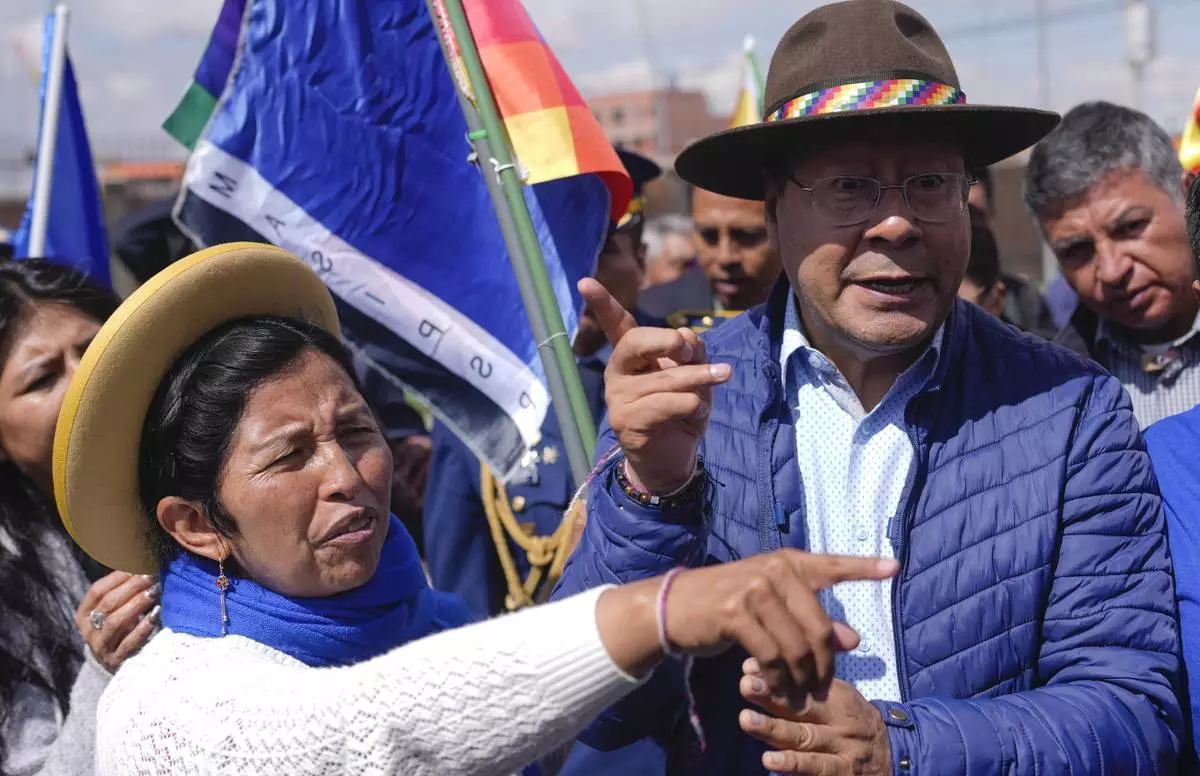
FILE - Julia Ramos, the newly named vice president of a faction of the Movement Towards Socialism (MAS) party, speaks with Bolivian President Luis Arce, in El Alto, Bolivia, Nov. 28, 2024. (AP Photo/Juan Karita, File)
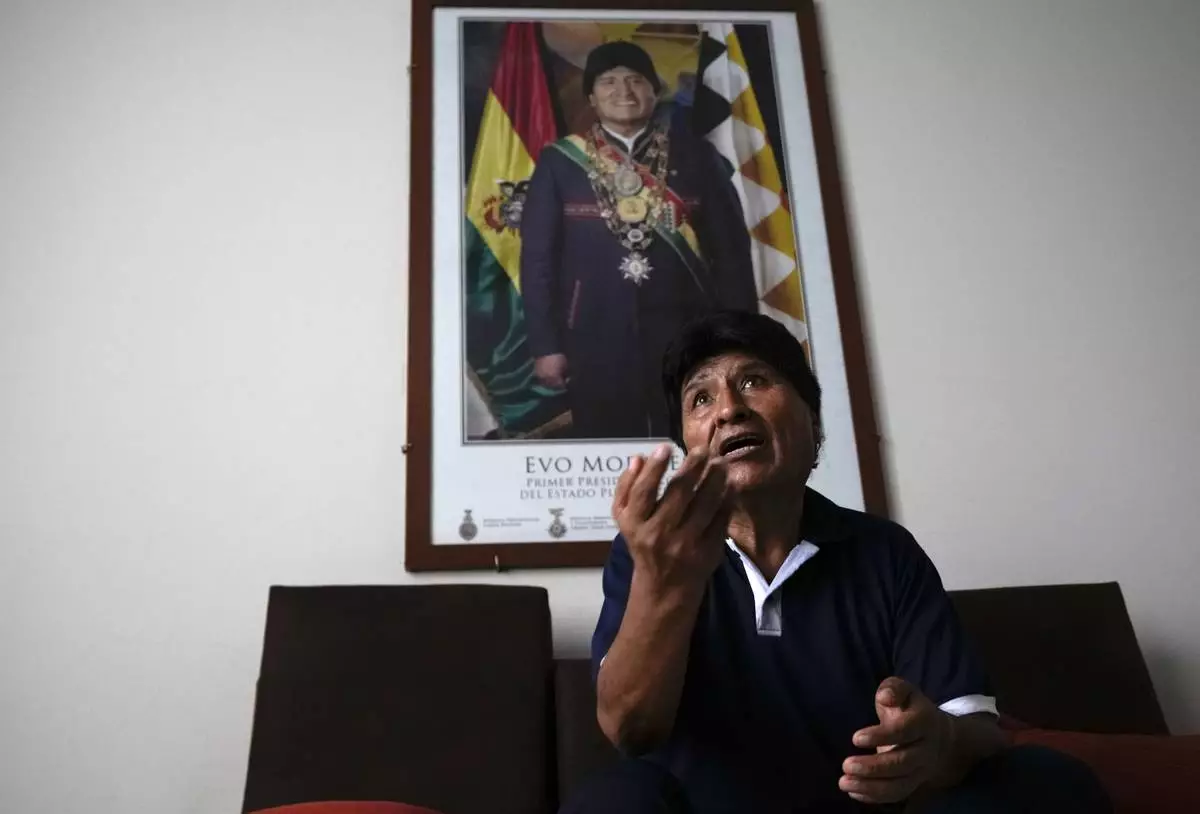
FILE - Bolivia's former President Evo Morales speaks during an interview in Lauca N in the Chapare region of Bolivia, Nov. 21, 2024. (AP Photo/Juan Karita, File)
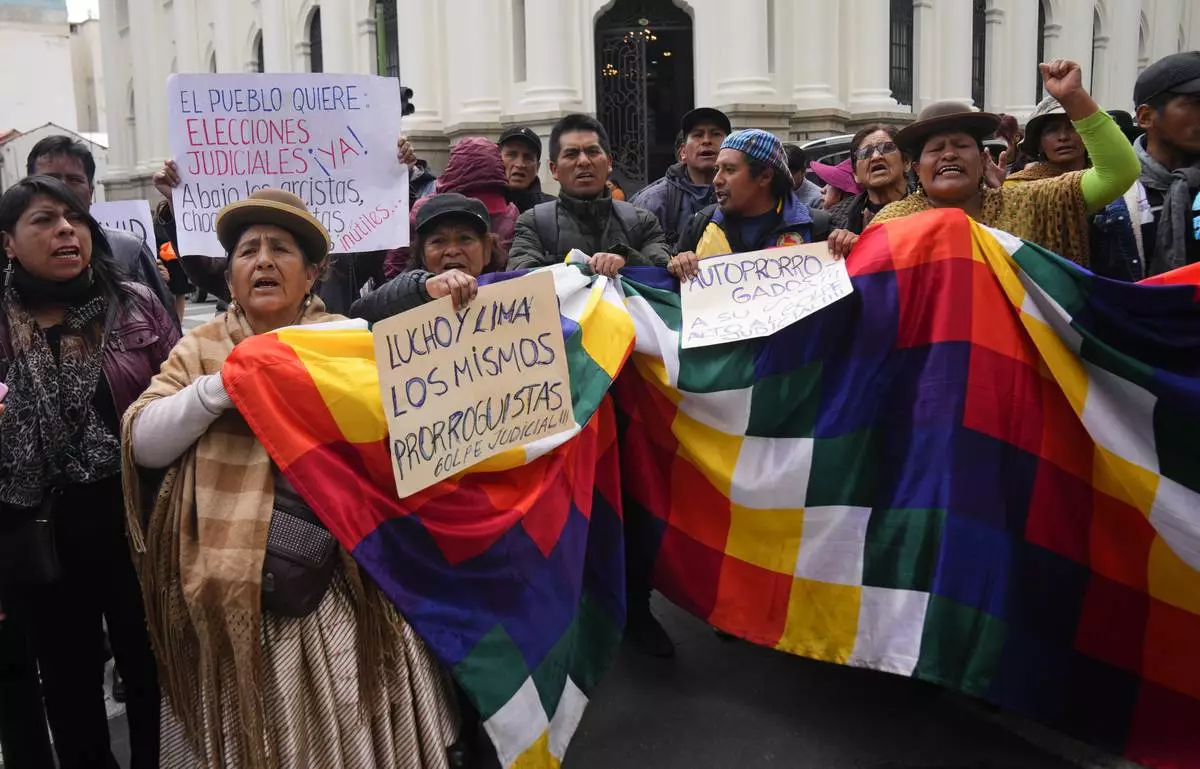
FILE - Supporters of former President Evo Morales protest the extension of the mandate for elected judges, who ruled against Morales' re-election and demand new judicial elections, in La Paz, Bolivia, Jan. 29, 2024. (AP Photo/Juan Karita, File)
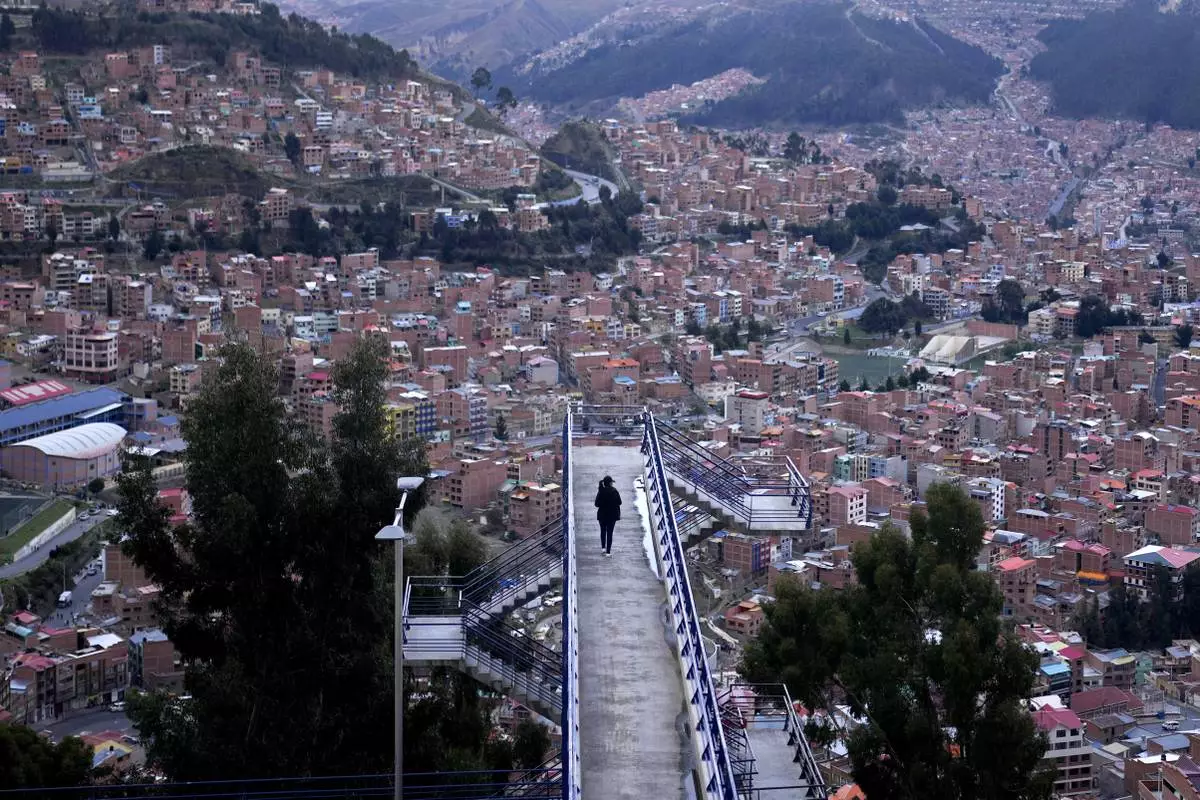
FILE - A woman walks across a pedestrian bridge in La Paz, Bolivia, Nov. 27, 2024. (AP Photo/Juan Karita, File)
HAMILTON, New Zealand (AP) — New Zealand showed off its presumptive new ball attack as it took control of the third test against England on the second day Sunday.
Matt Henry and Will O’Rourke shared seven wickets as New Zealand bowled out England for 143 in a session and a half to take a 205-run first innings lead.
O’Rourke then had to bat for the second time in the day as nightwatchman when Will Young was out for 60 within 20 minutes of the close. He couldn’t last to stumps at which New Zealand was 136-3, having increased its lead to 340.
Kane Williamson completed his 38th half century just before the close and was 50 not and Rachin Ravindra was 2.
Henry and O’Rourke likely will become New Zealand’s new ball attack when Tim Southee retires at the end of this, his 107th test. They previewed that partnership Sunday as Henry took 4-48 and O’Rourke took 3-33 in an outstanding New Zealand bowling performance.
Left-armer spinner Mitchell Santner took 3-7 including the wickets of Ollie Pope and Ben Stokes after leading a defiant last wicket stand with O’Rourke which occupied the first hour of the day until New Zealand’s last wicket fell at 347.
O’Rourke, a classic No. 11 with only 13 runs in nine tests at a strike rate of eight, gave Santner stalwart support in a partnership with frustrated England for 77 minutes at the end of the first day and the start of the second.
Santner reached his fourth half century with a six from the last ball of the first day. He carried on, taking the majority of the strike, before being bowled by Matthew Potts with the first ball after the morning drinks break.
O’Rourke faced 30 deliveries and was five not out, having taken 25 balls to get off the mark and having hit his first boundary in international cricket, a leg glance from the bowling of Gus Atkinson.
The duration of the partnership between Santner and O’Rourke was enough to cause England discomfort as it lifted New Zealand from 303-9 to 315-9 at stumps Saturday and on to 347.
O’Rourke went on to play a key role as New Zealand dismantled England’s first innings in 35.5 overs. He bowled at pace and found disconcerting bounce on a drying second day wicket at Seddon Park.
O’Rourke took the wickets of Jacob Bethell (12) and Harry Brook (0) with consecutive deliveries, then removed Joe Root (32) in his next over.
He first worked over Bethell with a series of short balls then offered him a full ball wide of off stump which Bethell sliced to Glenn Phillips in the gully.
He then produced a 148 kilometer (93mph) ball to Brook which the batter could only fend onto his own stumps. Brook has been New Zealand’s nemesis in this series, scoring 171 in the first test and 123 in the second, on both occassions rescuing England from poor starts.
Finally, he cramped Root with a short, fast ball which the batter tried to cut but only spar to Young in the gully. England was 82-5.
England has an unassailable 2-0 lead in the series after winning the first test by eight wickets and the second by 323 runs.
The England innings had began with an extraordinary onslaught from Zak Crawley who hit 16 runs from the second over, then was out when England was 32. He had hit 21 from 14 balls with five fours.
Crawley has struggled in this series with scores of 0, 1, 17 and 8 and Sunday’s opening partnership was England’s largest of the series after previous stands of 12, 9, 9 and 1.
Henry dived to take a catch at grasstop height from his own bowling to dismiss Crawley in the fifth over of England’s innings, then trapped Ben Duckett (11) lbw four balls later.
After O’Rourke’s triple strike, Santer removed Pope (24) and Stokes (27) in consecutive overs. He undid Pope with turn and bounce, causing him to edge to first slip, then trapped Stokes lbw as he knelt to sweep.
Henry returned to dismiss Gus Atkinson (4) and England crumbled to be all out four short of the follow-on which New Zealand didn’t enforce.
New Zealand lost Tom Latham early in its second innings for 19 by Young and Williamson added 89 for the second wicket. Young remains without a century in 20 tests.
AP cricket: https://apnews.com/hub/cricket
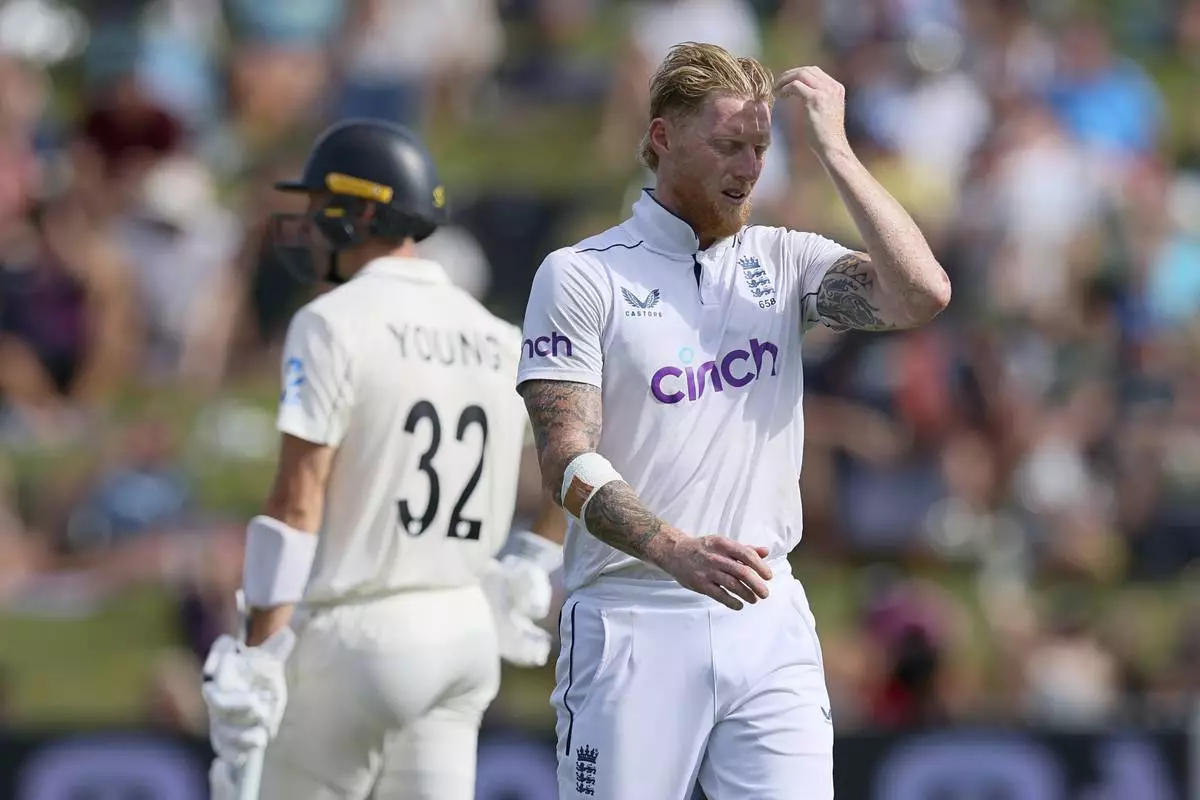
England captain Ben Stokes reacts during play on day two of the third cricket test between England and New Zealand in Hamilton, New Zealand, Sunday, Dec. 15, 2024. (Bruce Lim/Photosport via AP)
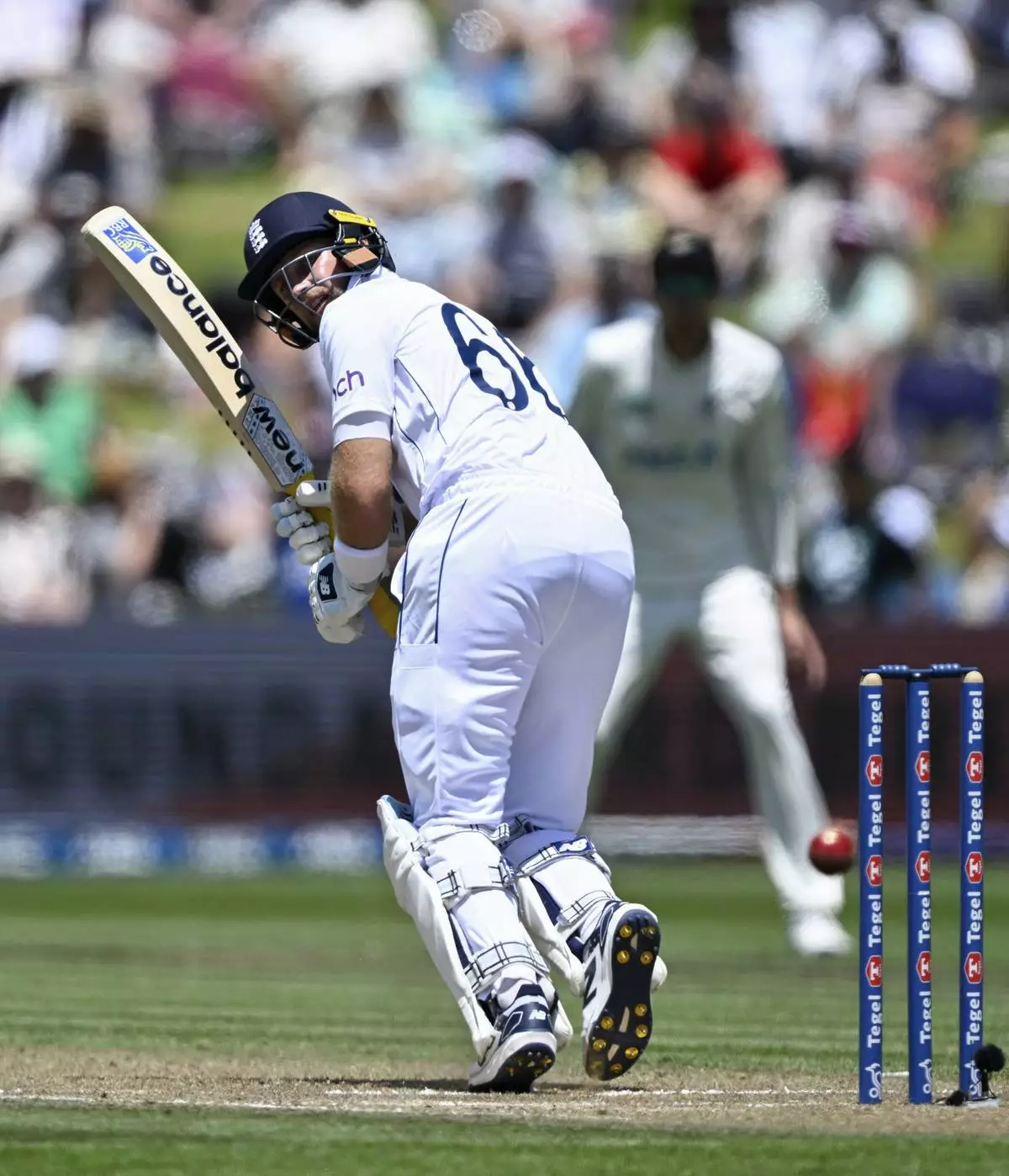
England's Joe Root bats during play on day two of the third cricket test between England and New Zealand in Hamilton, New Zealand, Sunday, Dec. 15, 2024. (Andrew Cornaga/Photosport via AP)
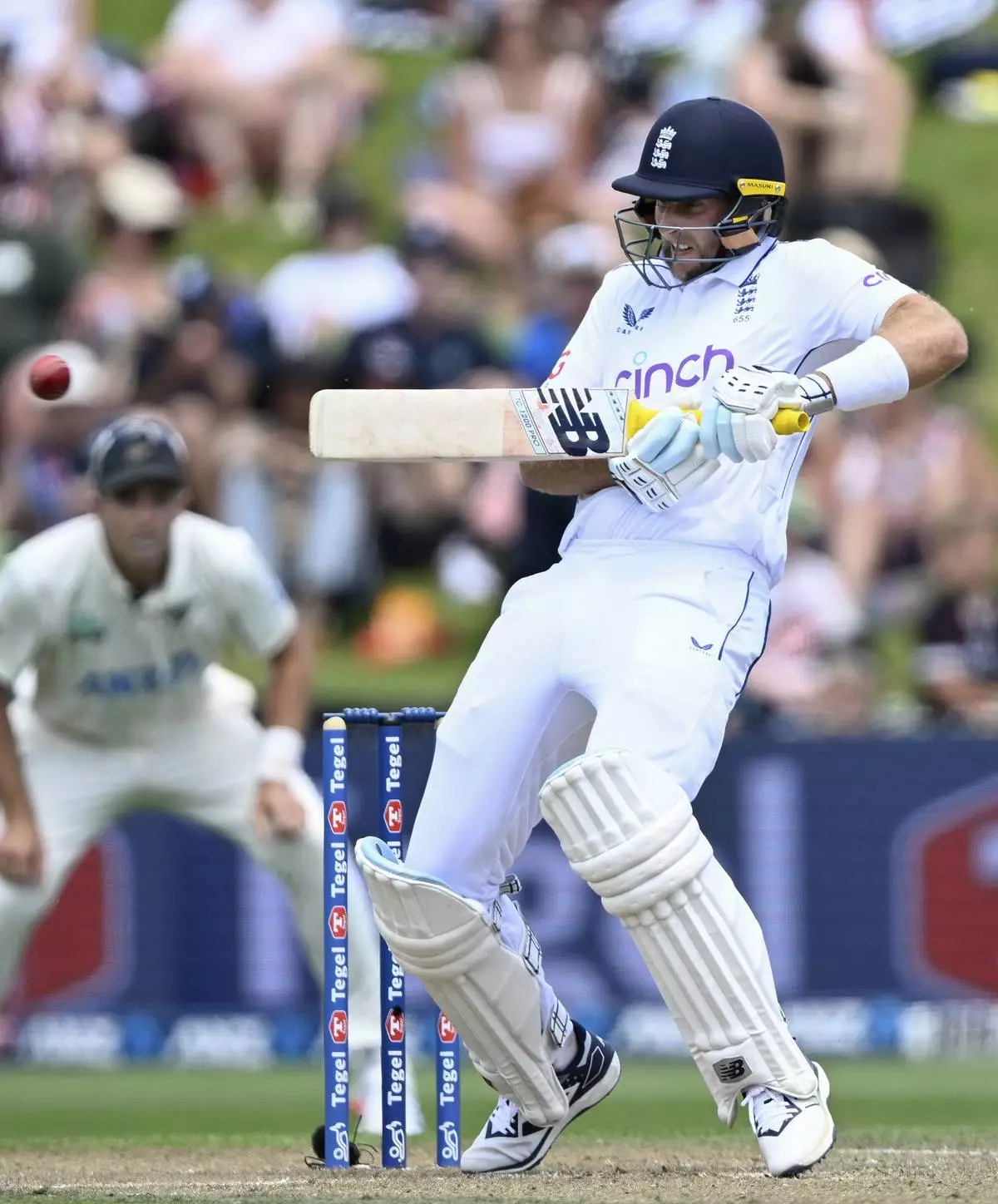
England's Joe Root bats during play on day two of the third cricket test between England and New Zealand in Hamilton, New Zealand, Sunday, Dec. 15, 2024. (Andrew Cornaga/Photosport via AP)
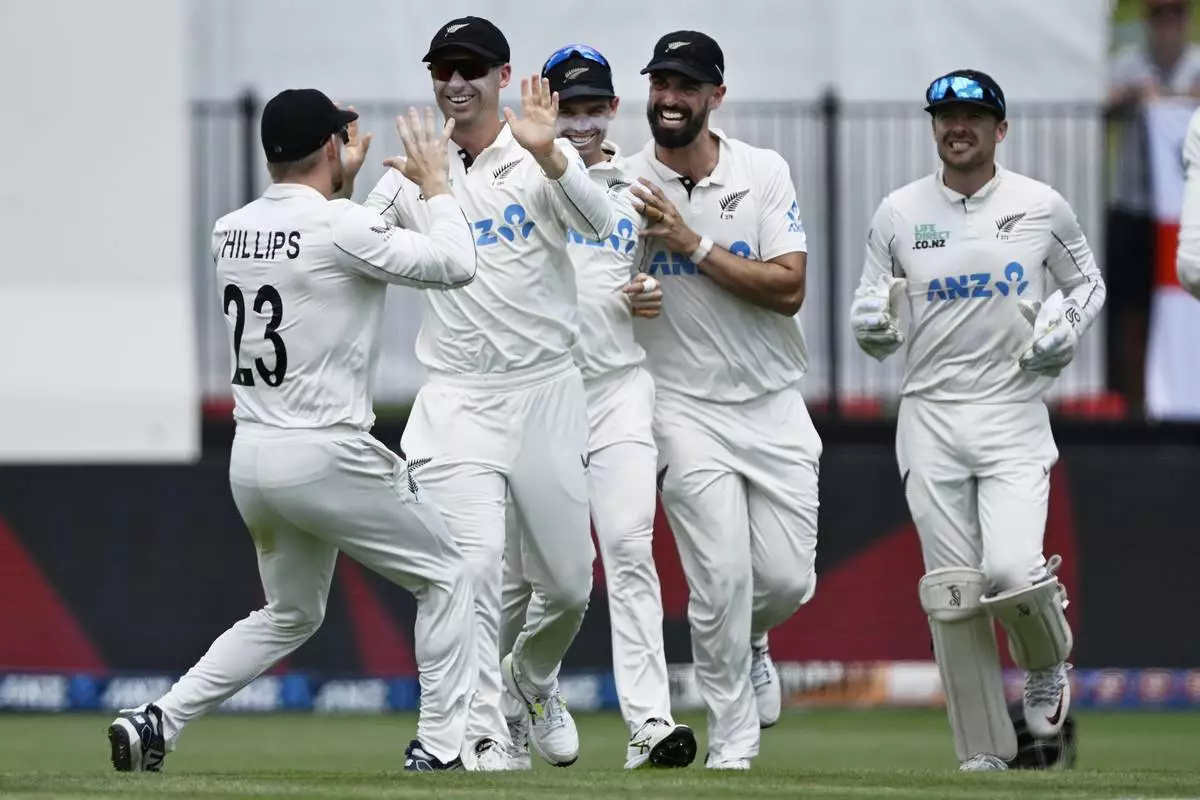
New Zealand players celebrate the wicket of England's Joe Root during play on day two of the third cricket test between England and New Zealand in Hamilton, New Zealand, Sunday, Dec. 15, 2024. (Andrew Cornaga/Photosport via AP)
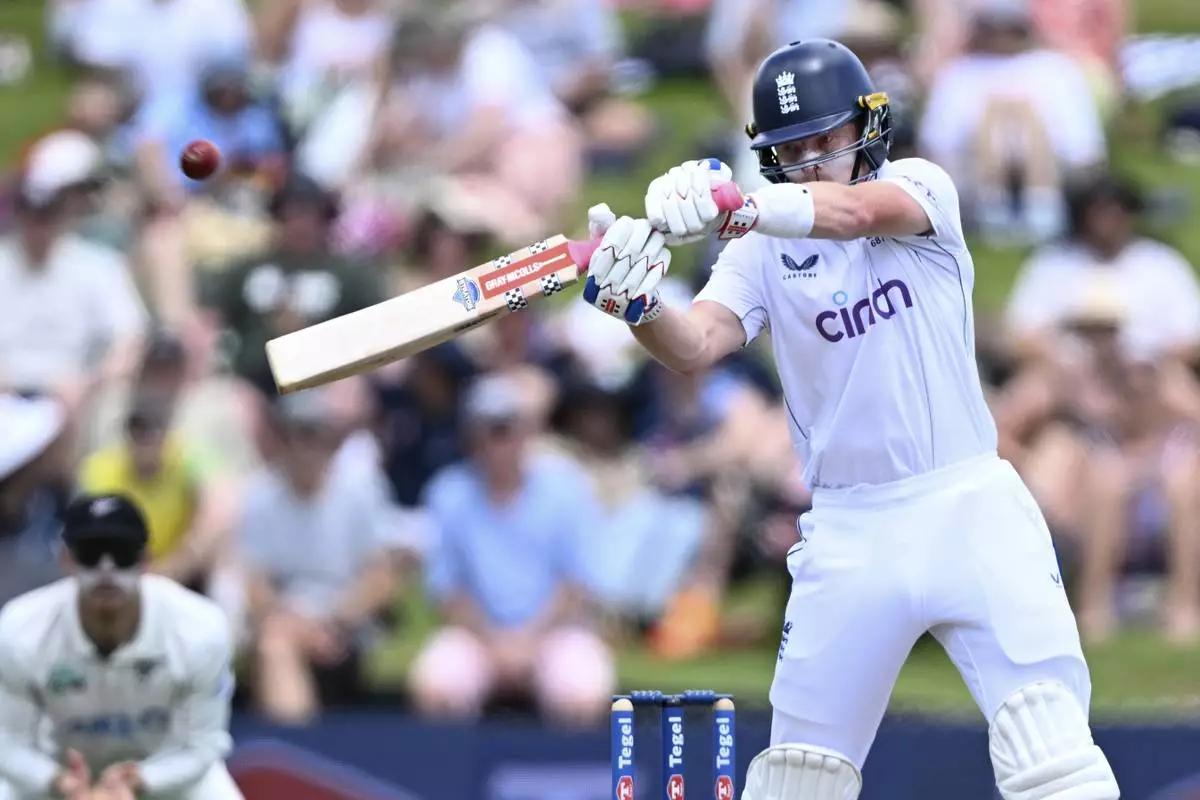
England's Ollie Pope bats during play on day two of the third cricket test between England and New Zealand in Hamilton, New Zealand, Sunday, Dec. 15, 2024. (Andrew Cornaga/Photosport via AP)
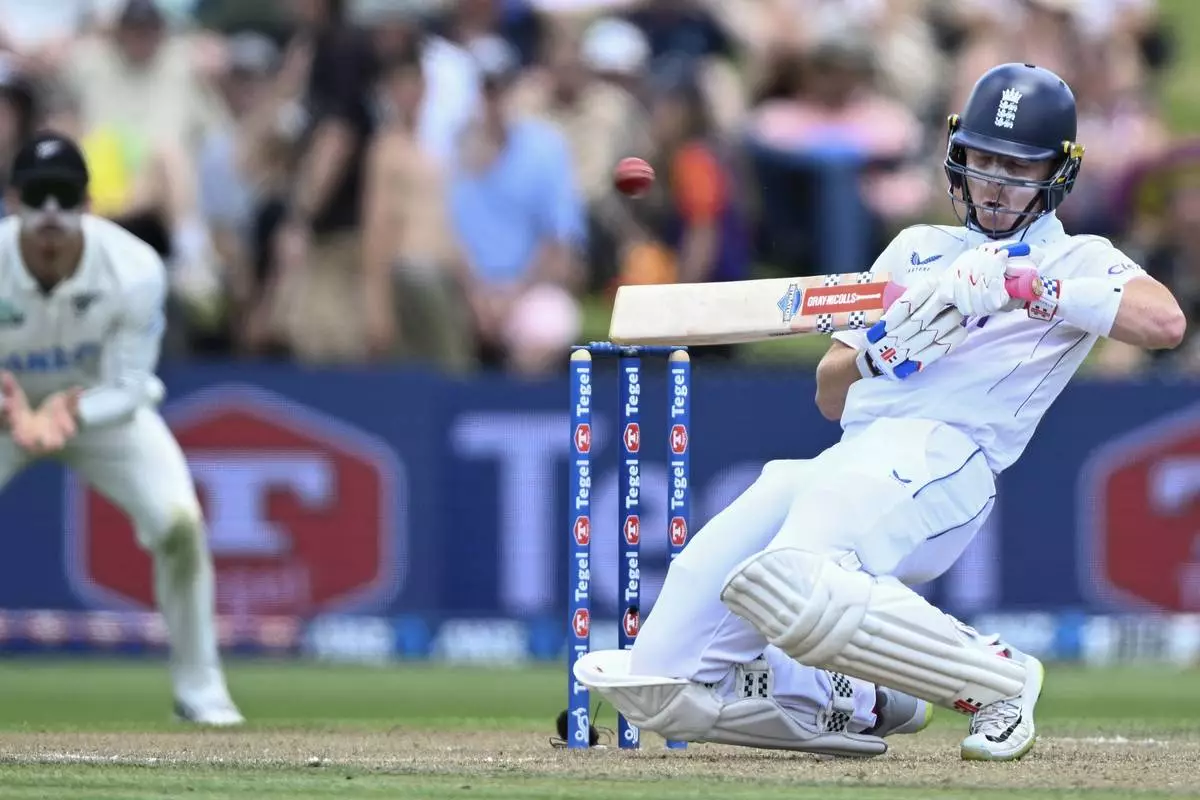
England's Ollie Pope bats during play on day two of the third cricket test between England and New Zealand in Hamilton, New Zealand, Sunday, Dec. 15, 2024. (Andrew Cornaga/Photosport via AP)
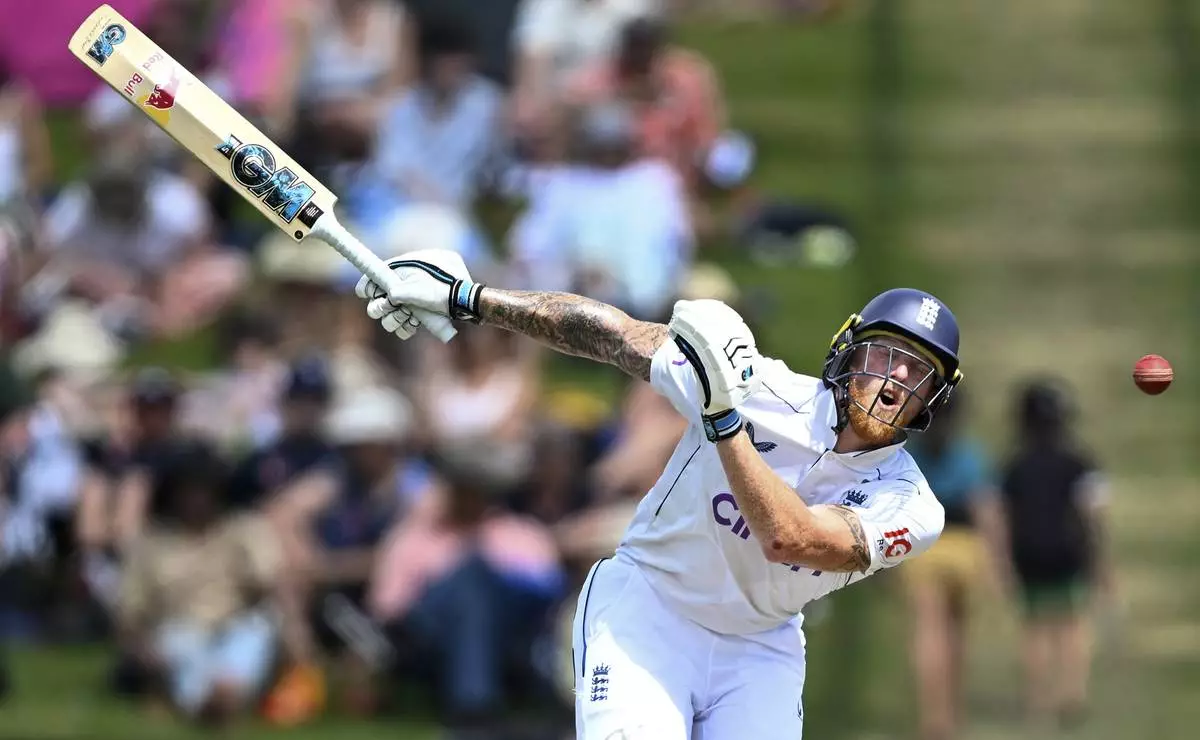
England captain Ben Stokes reacts while batting during play on day two of the third cricket test between England and New Zealand in Hamilton, New Zealand, Sunday, Dec. 15, 2024. (Andrew Cornaga/Photosport via AP)
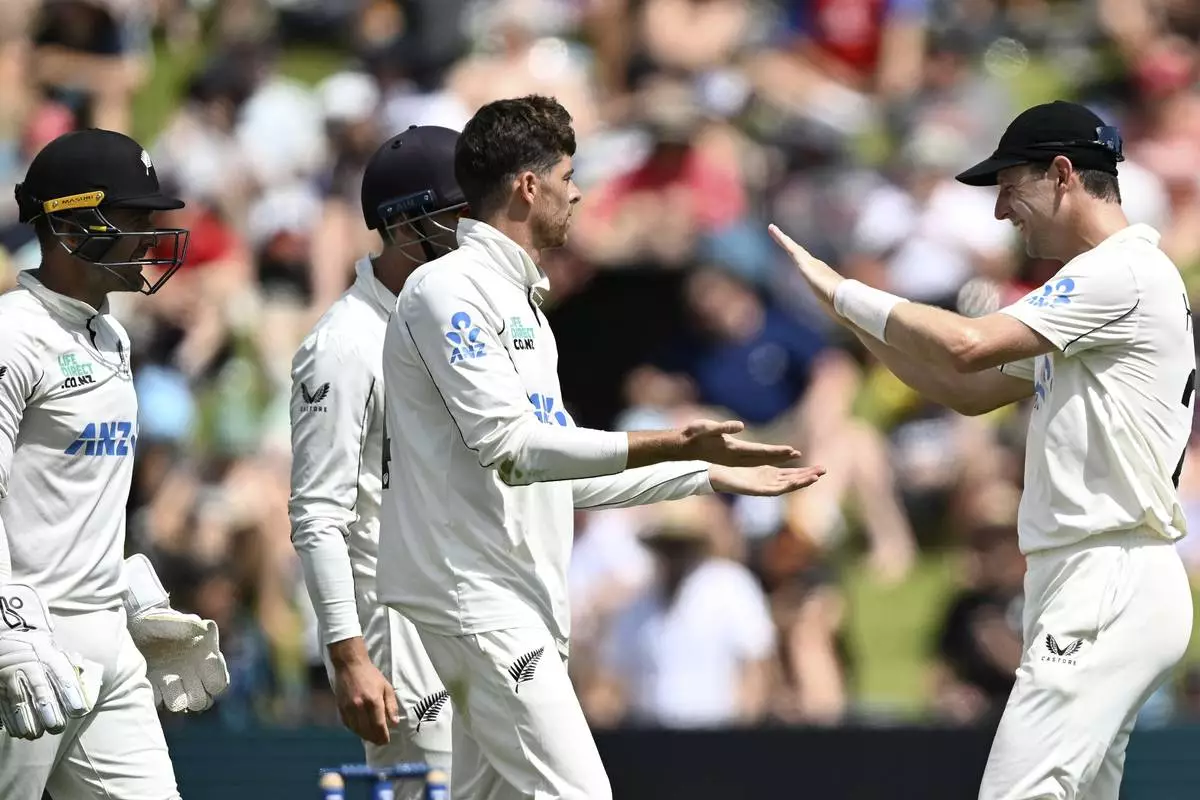
New Zealand bowler Mitchell Santner and Matt Henry, right, celebrate the wicket of England's Ollie Pope during play on day two of the third cricket test between England and New Zealand in Hamilton, New Zealand, Sunday, Dec. 15, 2024. (Andrew Cornaga/Photosport via AP)
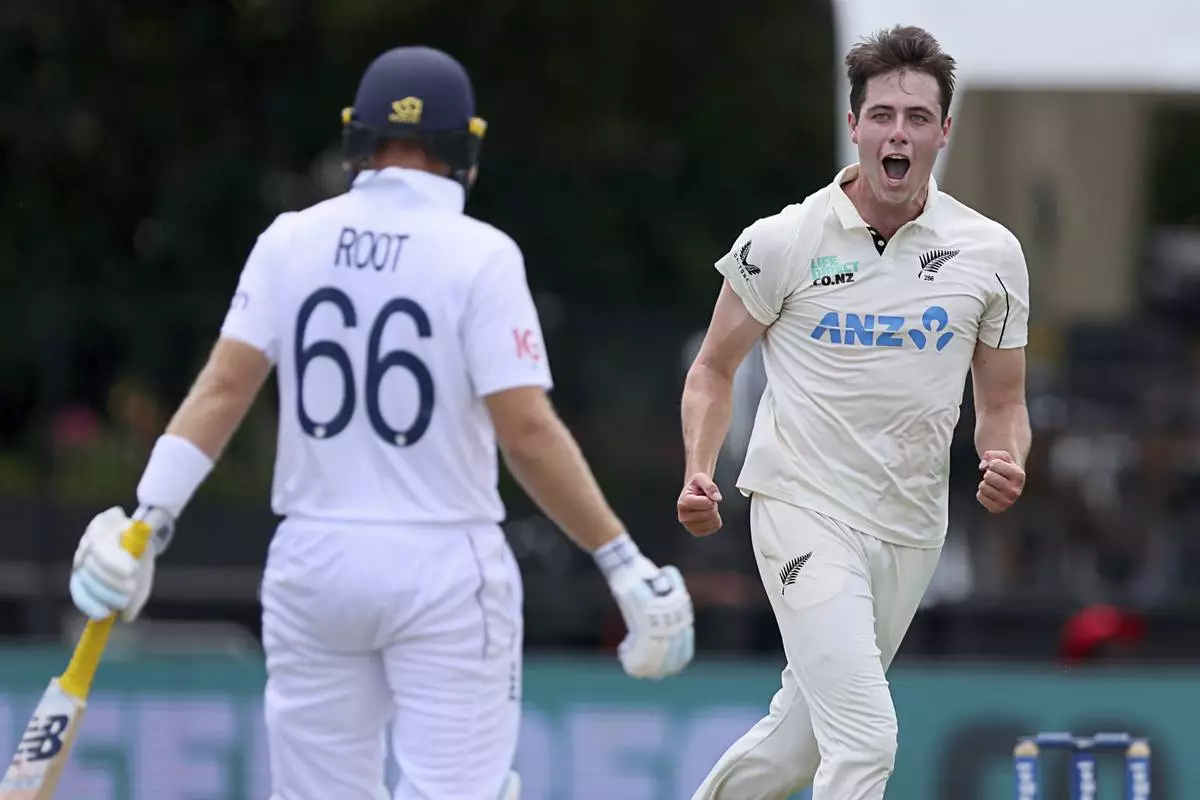
New Zealand bowler Will O'Rourke celebrates the wicket of England batsman Joe Root, left, during play on day two of the third cricket test between England and New Zealand in Hamilton, New Zealand, Sunday, Dec. 15, 2024. (Bruce Lim/Photosport via AP)
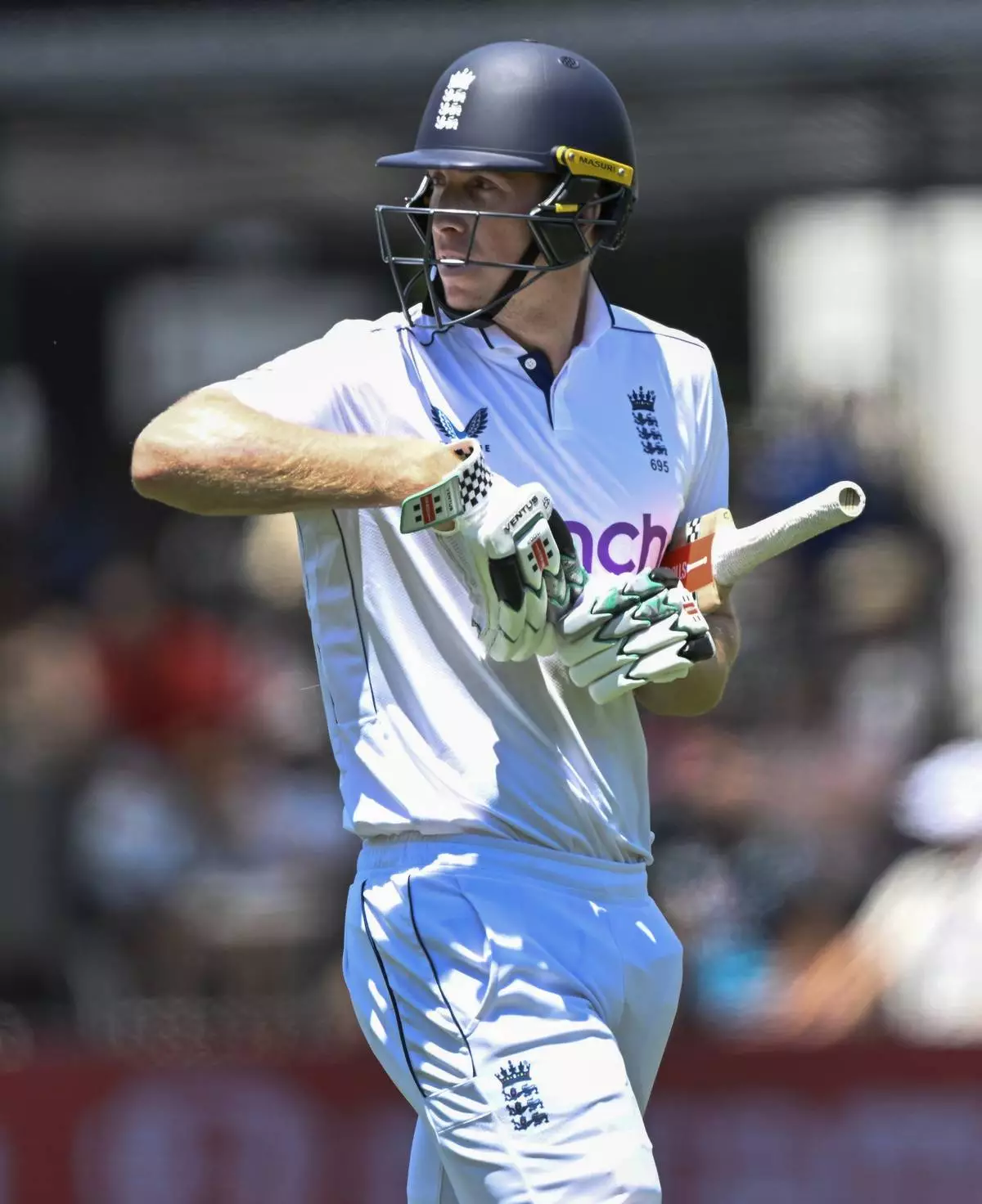
England's Zak Crawley reacts as he walks from the field after he was dismissed during play on day two of the third cricket test between England and New Zealand in Hamilton, New Zealand, Sunday, Dec. 15, 2024. (Andrew Cornaga/Photosport via AP)
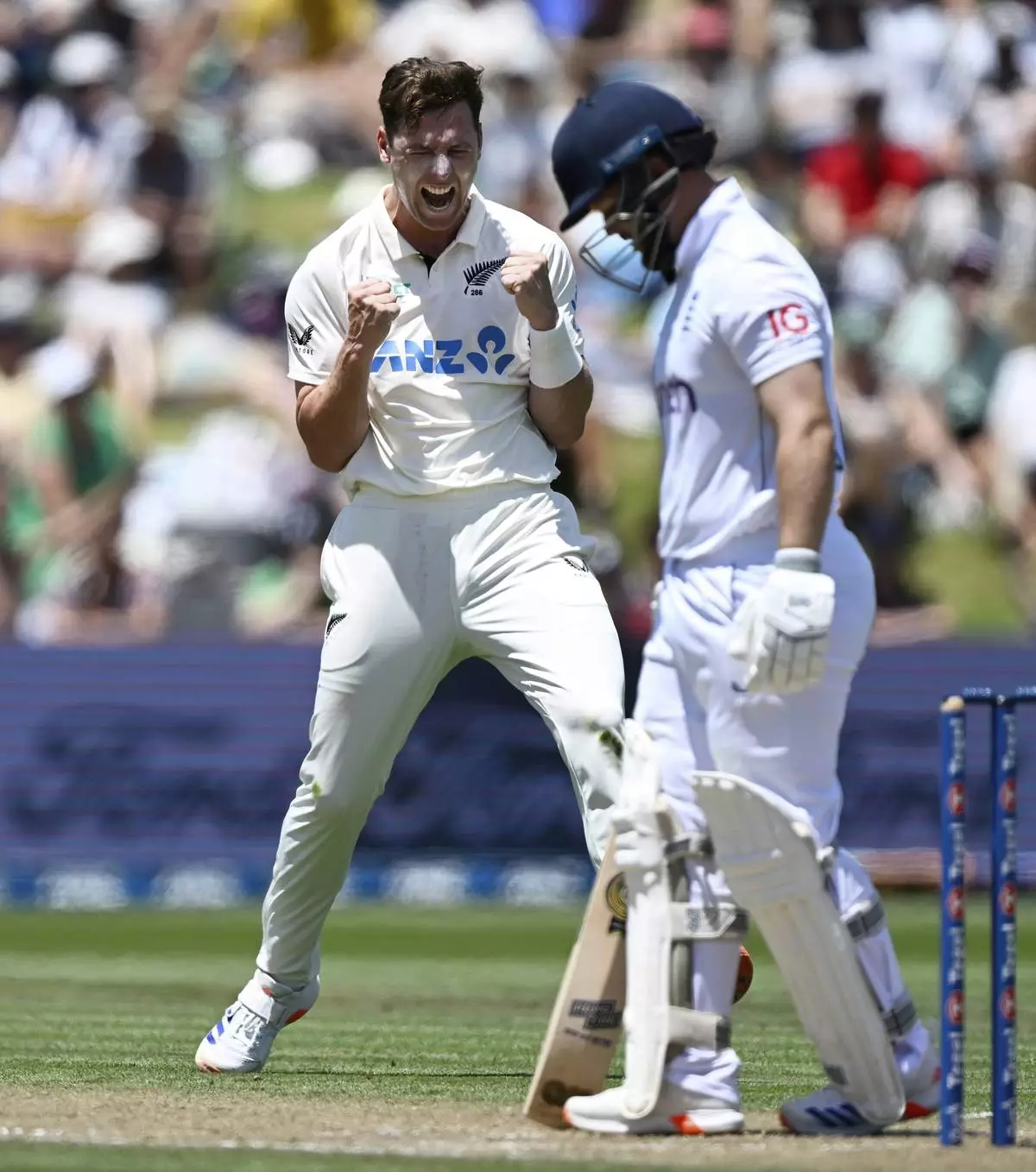
New Zealand bowler Matt Henry celebrates the wicket of England's Ben Duckett, right, during play on day two of the third cricket test between England and New Zealand in Hamilton, New Zealand, Sunday, Dec. 15, 2024. (Andrew Cornaga/Photosport via AP)
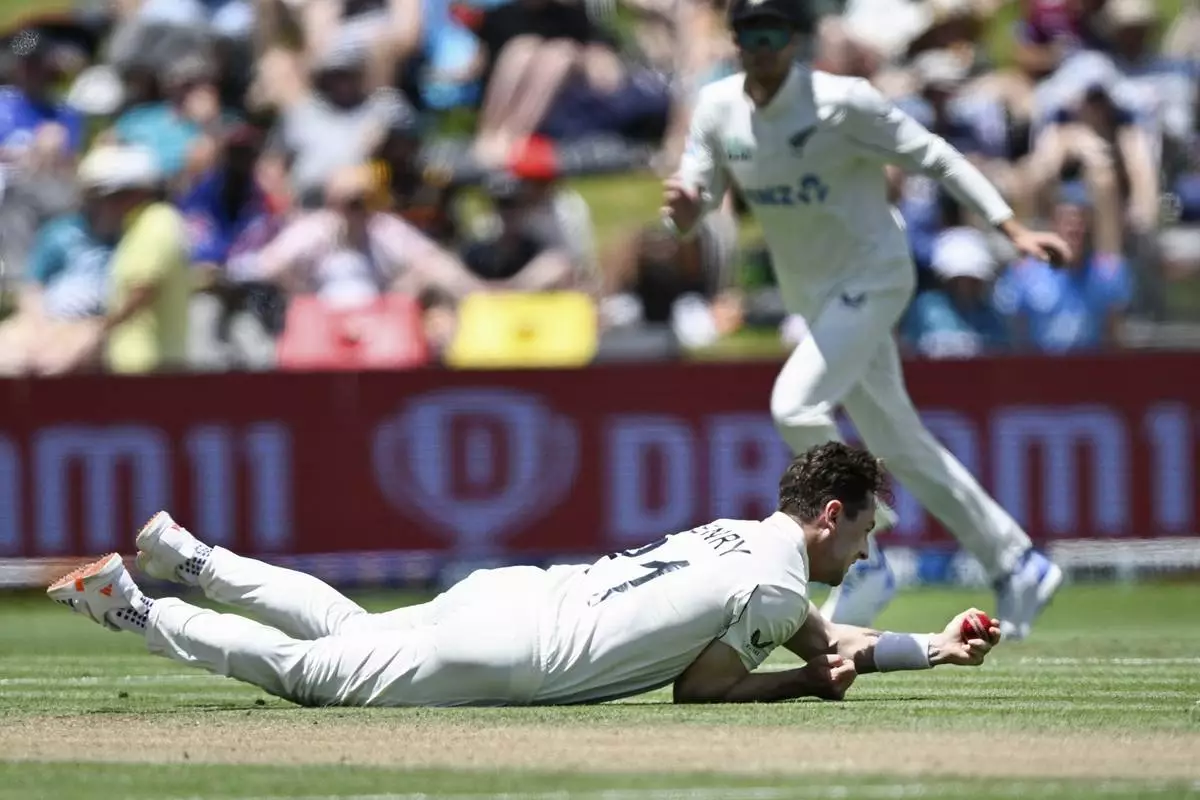
New Zealand's Matt Henry takes a catch off his own bowling to dismiss England's Zak Crawley during play on day two of the third cricket test between England and New Zealand in Hamilton, New Zealand, Sunday, Dec. 15, 2024. (Andrew Cornaga/Photosport via AP)
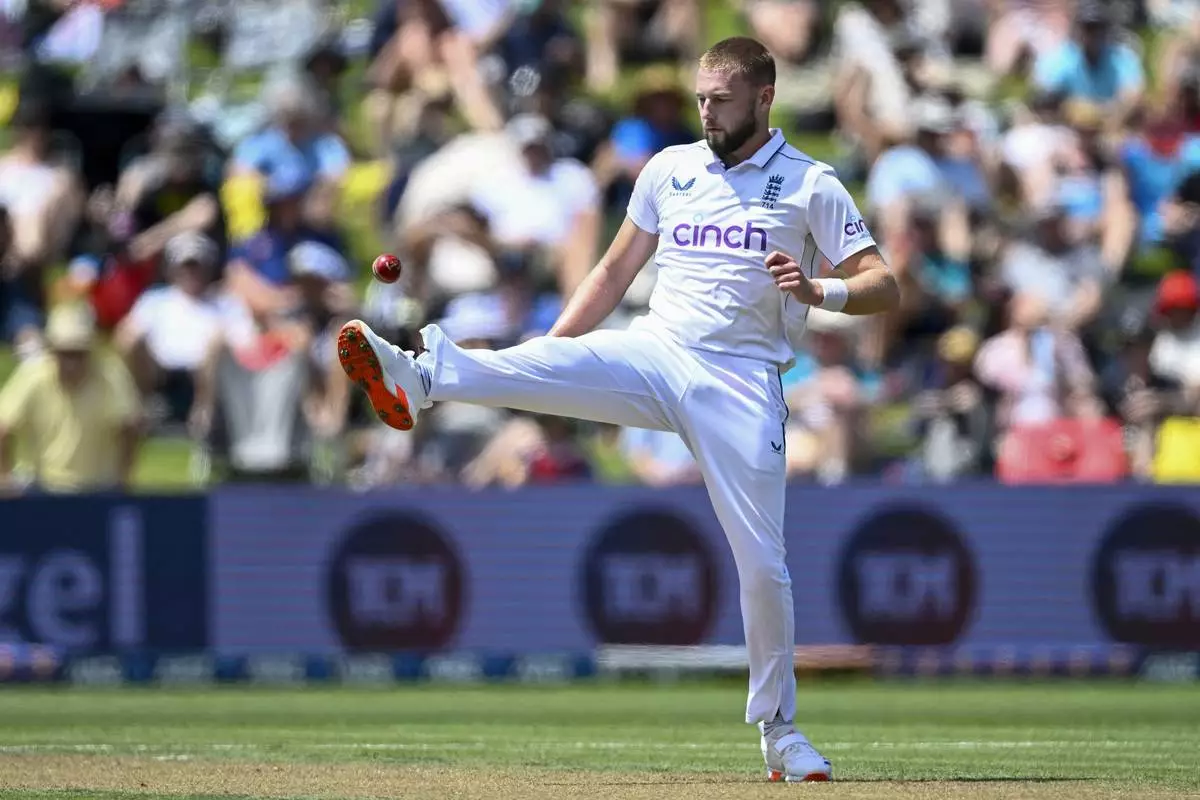
England's Gus Atkinson kicks at the ball during play on day two of the third cricket test between England and New Zealand in Hamilton, New Zealand, Sunday, Dec. 15, 2024. (Andrew Cornaga/Photosport via AP)
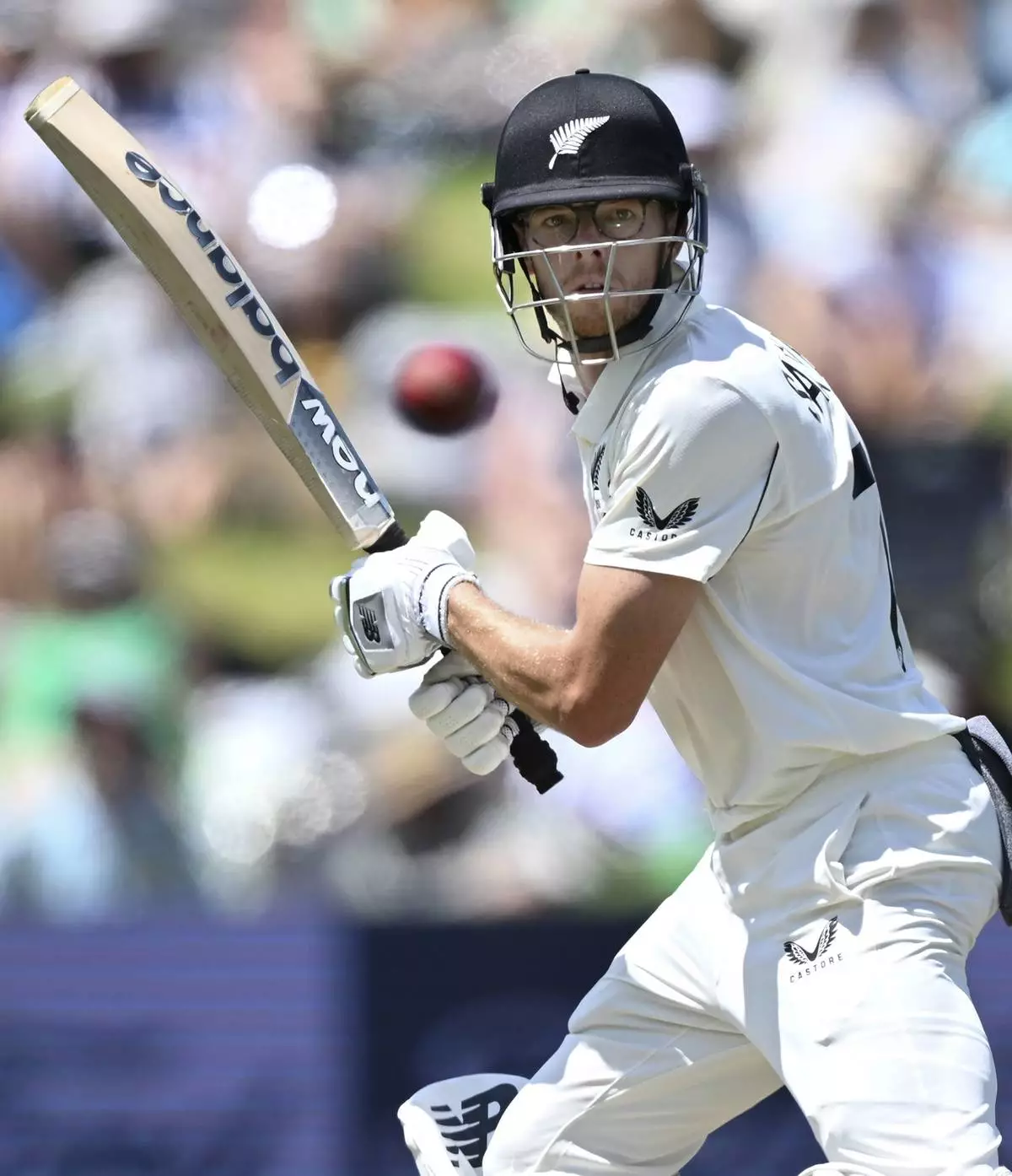
New Zealand's Mitchell Santner bats during play on day two of the third cricket test between England and New Zealand in Hamilton, New Zealand, Sunday, Dec. 15, 2024. (Andrew Cornaga/Photosport via AP)









